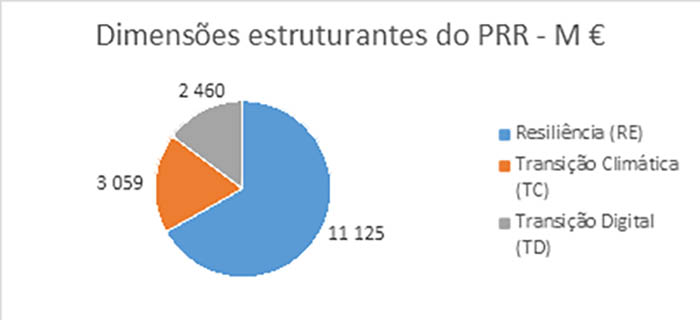To mitigate the harmful effects of the Covid-19 pandemic, the European Union (EU) created an instrument called NextGenerationEU (NGEU), which is the largest package of measures to stimulate economies ever created in Europe.
The program reaches 2.018 billion euros at current prices, financed mostly through joint debt, and which seeks to contribute to economic reconstruction in post-pandemic Europe, with a special focus on resilience, climate efficiency and the digital transition.
In the specific case of Portugal, the recovery program is called the “Recovery and Resilience Plan” (PRR) and consists of a set of measures, in the form of reforms and investments, with a time horizon of 6 years (3 years to assume the respective commitments plus another 3 years to complete the implementation of the projects).
The PRR is based on 3 structuring dimensions (Resilience, Climate Transition and Digital Transition) that unfold into a further 20 components, which include a set of 37 renovations and 83 investments, totaling 16.644 million euros (M€).

The national PRR is a transversal program, with an execution period ending in 2026, which seeks to implement a set of strategic initiatives (reforms and investments) with a view to the progressive recovery, sustained economic growth and digital and climate development of All country. The initiatives provided for in the plan have an estimated total funding of €16,6 million, divided into approximately €14 billion in grants and €2,6 billion in loans.
For the Algarve, resilience measures (in general) are particularly relevant, which may allow the region to diversify its economy and reduce its exposure to the Tourism sector, which is more susceptible to the impact of pandemics and other levels of constraint on a global scale.
Diversification, according to the financial literature, is the best way to manage risk and this will be of vital importance for the Algarve to be more resilient in the future.
The components of water and sea management will be equally fundamental for the region, due to the primordial importance that both assume, and which, predictably, will continue to assume, in the southernmost region of mainland Portugal.
At national level, the PRR is a unique opportunity to recover the country from the disastrous impacts of the pandemic and to prepare it for a more sustainable, digital future, capable of resisting adversity.
The name “bazooka” is often used with reference to the PRR, just to better express the high financial resources available for the implementation of the initiatives provided for in the strategic vision of the plan, which is endorsed by the highest European authorities.
We are, therefore, facing a unique opportunity to access structural funds to recover and develop the country. However, at the same time, we face a high risk that the objectives will not be achieved and that the opportunity will be irretrievably lost, given the short time horizon for implementing the plan, taking into account the high number of measures and the ambitious objectives proposed.
To avoid future regrets, the country will have to be able to plan and implement all initiatives by 2026, which may seem like a long time, but which can easily become scarce given the dimension and complexity of the different components.
The plan will also have to be constantly monitored and with very tight control and supervision to avoid undue use of available resources, thus increasing the level of confidence, both from the Portuguese population and from the European authorities.
Political convergence, the unity of civil society, companies and public institutions will also be essential for the plan to be successful and for us to have in 2026 a stronger, developed, inclusive and resilient country.
Author Pedro Silva is Financial Manager, Economist and Professor at the Faculty of Economics of the University of Algarve
Note 1: the content of this article does not necessarily reflect the position of the Regional Delegation of the Order of Economists. The opinion expressed is the sole responsibility of the author.
Note 2: article published under the protocol between the Sul Informação and the Algarve Delegation of the Order of Economists


















Comments